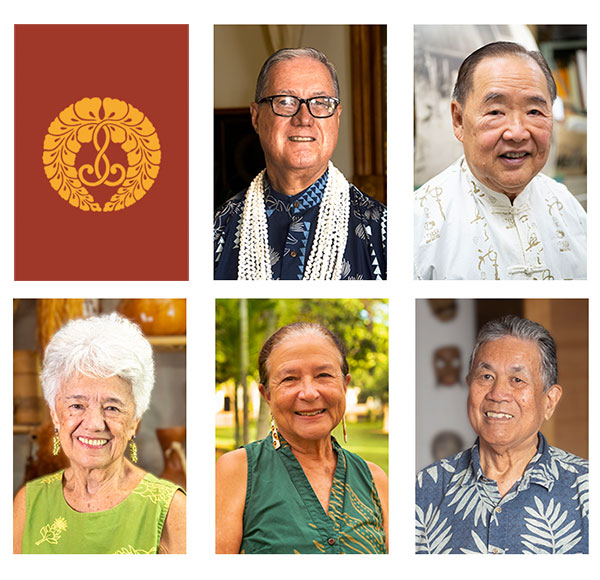
NEWS RELEASE – for immediate release
January 30, 2024
Contact: Derrick Inouye 808-522-9200, dinouye@honpahi.org
Living Treasures of Hawai‘i™ Selects 2024 Honorees
Honolulu, Hawai‘i – The Living Treasures of Hawai‘i™ proudly announces its distinguished honorees for the 49th annual event, recognizing five exceptional individuals who have left an indelible mark on their respective fields and enriched the fabric of Hawai‘i’s unique culture.
This year’s honorees — Davianna McGregor, Douglas Chong, Sarah Keahi, Julian Ako, and Ricardo Trimillos — are being celebrated for their significant contributions to our local communities and the broader cultural landscape.
The Living Treasures of Hawai‘i™ is an esteemed recognition program that identifies individuals who demonstrate excellence, honoring their outstanding achievements, social and cultural impact, professional commitment, and the embodiment of values cherished by our distinct and diverse island community.
The Recognition Program and Gala Luncheon are scheduled to take place on Saturday, February 10, 2024, at 11 a.m. in the Coral Ballroom at the Hilton Hawaiian Village Waikiki Beach Resort. Tickets for the Recognition Program and Gala Luncheon are available through the Honpa Hongwanji Mission of Hawaii website. [Sales ended as of Feb. 1; a waitlist may be available.]
The following individuals have been chosen as this year’s Living Treasures of Hawai‘i™:
Davianna Pomaikai McGregor
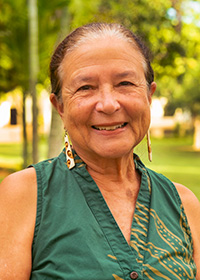 Davianna McGregor is a Professor Emerita, having devoted 49 years to the University of Hawai‘i at Manoa. As a trailblazer in the field of Ethnic Studies, a dedicated community activist, and a healthcare advocate, McGregor’s legacy is a testament to her unwavering commitment to education, cultural preservation, and community well-being.
Davianna McGregor is a Professor Emerita, having devoted 49 years to the University of Hawai‘i at Manoa. As a trailblazer in the field of Ethnic Studies, a dedicated community activist, and a healthcare advocate, McGregor’s legacy is a testament to her unwavering commitment to education, cultural preservation, and community well-being.
McGregor played a pivotal role in the establishment and growth of Ethnic Studies at the University of Hawai‘i at Manoa. Serving as the first Acting Director for Ethnic Studies and later as Director in 1990, she was instrumental in elevating the department to offer a Bachelor of Arts degree. McGregor’s visionary leadership extended beyond traditional academic boundaries. She pioneered ‘āina/place-based learning, emphasizing community service learning and undergraduate peer instruction.
A prolific scholar, McGregor’s body of work comprises over 83 publications that have reached international, national, and local audiences. Her scholarship is deeply rooted in the importance of caring for lands, water, and people. One of her notable contributions is the book “Na Kua‘aina: Living Hawaiian Culture” (2007), a groundbreaking work that received the Kenneth W. Baldridge Prize for the best history book by a Hawai‘i resident from 2005-2007.
Beyond academia, McGregor emerged as a key leader in the Protect Kaho‘olawe ‘Ohana. For four decades, she played a pivotal role in the organization, shouldering significant responsibilities in efforts to stop the bombing and heal the island of Kaho‘olawe. Her tireless work aimed to bring harmony to places in Hawai‘i marked by historical and cultural trauma.
McGregor’s influence extends to advising numerous Hawai‘i agencies, groups, and national government organizations. As an expert witness on traditional and contemporary Hawaiian customs and practices, she has been a powerful advocate for the recognition and preservation of Hawaiian culture. Her deep knowledge of Hawaiian kingdom history, Hawaiian activism, and cultural practices has made her a sought-after resource and advisor.
On a personal level, McGregor addressed critical healthcare needs on Moloka‘i. She played a pivotal role in establishing the Dr. Noa Emmett Aluli Kuʻi Lāʻau Health Fund, which collaborates with Molokaʻi primary care providers to address medical gaps on the island. McGregor’s efforts extended to organizing health screenings, developing programs to fill care gaps, and creating a healthcare training curriculum infused with place-based cultural knowledge.
Douglas D.L. Chong
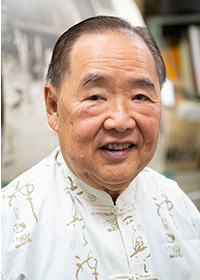 Douglas Chong a fifth-generation American-born Chinese, stands as Hawai‘i’s preeminent authority on the history of the Chinese in the islands, a distinction earned through decades of continuous dedication to preserving and sharing his cultural heritage. Born and raised in Hawai‘i, Chong is recognized for his profound knowledge, commitment to tradition, and unwavering efforts to impart Chinese history and culture.
Douglas Chong a fifth-generation American-born Chinese, stands as Hawai‘i’s preeminent authority on the history of the Chinese in the islands, a distinction earned through decades of continuous dedication to preserving and sharing his cultural heritage. Born and raised in Hawai‘i, Chong is recognized for his profound knowledge, commitment to tradition, and unwavering efforts to impart Chinese history and culture.
With degrees in Asian Studies, Education, and American Studies, Chong combines academic excellence with a deep-rooted connection to his heritage. His traditionalist approach sets him apart, not merely as a scholar but as a devoted cultural steward. Beyond teaching about Chinese traditions, Chong actively engages in practicing and teaching the rituals and practices of Chinese memorial rites, embodying the essence of cultural preservation.
For thirty years, Chong has been a vital contributor to the Chinese Chamber of Commerce of Hawai‘i, volunteering his expertise in conducting Chinese History and Culture classes for contestants participating in the Narcissus Pageant. His commitment to community education extends further through the operation of the Hawai‘i Chinese History Center, where he served as the sole resource person. This center became a hub for researchers worldwide, seeking insights into Chinese history, geographic origins, immigration experiences, family genealogy, and relevant laws.
Professionally, Chong dedicated forty years to education within the University of Hawai‘i college system and the Department of Education. His passion for teaching extended beyond the conventional classroom setting as he served for decades in the State of Hawai‘i Department of Education Adult Education. He focused on empowering immigrant Chinese adults with advanced survival English skills and providing intensive courses in math, reading, and social sciences to adults seeking to obtain their GED high school certificates.
Fluent in five Chinese dialects, Chong is frequently called upon by international sister organizations reaching out to local entities seeking collaboration and knowledge-sharing.
Sarah Ilialoha Ayat Keahi
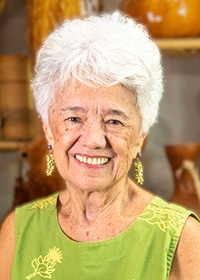 Sarah Ilialoha Keahi stands as a distinguished leader in the Hawaiian musical renaissance, renowned for her significant contributions to the revival of the Hawaiian language and education. Born with a passion for preserving and propagating the cultural heritage of Hawai‘i, Sarah’s life has been marked by a profound commitment to imparting knowledge and fostering a deep connection with the history and traditions of the islands.
Sarah Ilialoha Keahi stands as a distinguished leader in the Hawaiian musical renaissance, renowned for her significant contributions to the revival of the Hawaiian language and education. Born with a passion for preserving and propagating the cultural heritage of Hawai‘i, Sarah’s life has been marked by a profound commitment to imparting knowledge and fostering a deep connection with the history and traditions of the islands.
Sarah embarked on her academic journey at the University of Hawai‘i at Manoa, where she earned a Bachelor’s degree in English and Hawaiian. Furthering her education, she attained a Master’s degree in Pacific Island Studies and obtained her teaching credential in Secondary Education.
For four decades, Sarah Keahi served as a beacon of inspiration and wisdom at Kamehameha Schools, where she not only taught Hawaiian language, history, and culture but played a pivotal role in shaping the Hawaiian language curriculum. Thanks to her pioneering efforts, the Hawaiian language became a mandatory component of the educational journey for all students at Kamehameha Schools. Sarah’s influence extended beyond the classroom, as she mentored and guided eight Hawaiian Language instructors, a testament to her enduring legacy.
Throughout her career, Sarah remained a dedicated student herself, studying under the esteemed Kumu Hula Maiki Aiu Lake for over 50 years. She has become a respected Kumu Hula herself, lending her expertise as a hula dancer and contributing to the preservation of Hawaiian traditions.
Her involvement in the Hawai‘i Civic Club and her role as a judge in hula competitions showcase her commitment to the broader community. Notably, she played a crucial role in connecting ‘Iolani Schools to its founder, contributing historical insights for their inaugural Founders Day Celebration.
As a veteran Kumu Olelo, Sarah Ilialoha Keahi continues to be a living embodiment of the Hawaiian language. Her gift, not just as a linguist but as a storyteller and educator, has touched the lives of many.
Julian Keikilani Ako
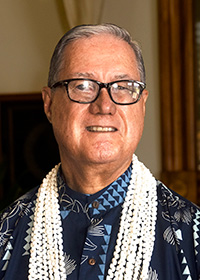 Julian Keikilani Ako, is celebrated for his multifaceted contributions to education, Hawaiian culture, music, and global outreach. His lifelong commitment to shaping the lives of young individuals and fostering a deep sense of cultural identity has earned him accolades locally, nationally, and globally.
Julian Keikilani Ako, is celebrated for his multifaceted contributions to education, Hawaiian culture, music, and global outreach. His lifelong commitment to shaping the lives of young individuals and fostering a deep sense of cultural identity has earned him accolades locally, nationally, and globally.
For nearly four decades, Ako dedicated himself to Kamehameha Schools, where he served as both a teacher and administrator. His impact goes beyond traditional education, as he prepared thousands of Native Hawaiian youths for higher education, instilling in them the values of service and leadership. Under Ako’s guidance, Kamehameha Schools evolved from a school for Hawaiian children and youth to a Hawaiian school for Hawaiian children and youth, marking a significant integration of Hawaiian culture into the core curriculum.
Ako’s leadership extended beyond the classroom and school grounds. As a member of the Interscholastic League of Honolulu’s board, he played a pivotal role in shaping league policies. Additionally, as co-chair of the Harvard University Principals Center National Advisory Board, Ako provided essential guidance to the Harvard Graduate School of Education, drawing upon his wealth of experience as an educator.
Upon retirement, Ako continued his mission to enhance the lives of Native Hawaiians through his vast knowledge, experience, and wisdom. An accomplished and award-winning composer of mele (songs), Ako’s musical contributions have earned him two Nā Hōkū Hanohano Haku Mele of The Year Awards in 2001 and 2003. His accolades extend to winning 1st place in the Hō‘ike‘ike O Wai‘anae Festival’s Hawaiian Song Composition Competition.
Julian Keikilani Ako’s leadership and contributions have left an indelible mark on education, music, and cultural exchange. His legacy continues to inspire generations, embodying the spirit of aloha and cultural pride that defines Hawai‘i’s community.
Ricardo D. Trimillos
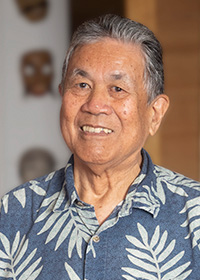 Ricardo “Ric” Trimillos, Professor Emeritus of Ethnomusicology at the University of Hawai‘i, is recognized for his profound impact on the preservation and perpetuation of the islands’ cultural, musical, and artistic traditions. Throughout his career, Trimillos has not only been a distinguished academic and researcher but also a dedicated advocate for Hawaiian music and a mentor to countless students.
Ricardo “Ric” Trimillos, Professor Emeritus of Ethnomusicology at the University of Hawai‘i, is recognized for his profound impact on the preservation and perpetuation of the islands’ cultural, musical, and artistic traditions. Throughout his career, Trimillos has not only been a distinguished academic and researcher but also a dedicated advocate for Hawaiian music and a mentor to countless students.
As Professor Emeritus of Ethnomusicology at the University of Hawai‘i at Manoa’s Department of Music and former Chair of Asian Studies at the UHM School of Hawaiian, Asian, and Pacific Studies, Trimillos has played a pivotal role in shaping the academic landscape. His expertise extends globally, as he has served as an international consultant on ethnomusicology, sharing his knowledge and insights with various governments and institutions.
Trimillos is renowned worldwide for his work in ethnomusicology, with research foci on Asian culture in the diaspora, Hawaiian music and dance, the music of Muslim groups in the Southern Philippines, and the traditional music of Japan. His theoretical emphases on ethnic identity, arts and public policy, and gender in the arts of the Pacific and Asia have contributed significantly to the academic discourse.
Beyond academia, Trimillos is a versatile and accomplished performer. Trained in classical piano, he excels in rondalla, kulintang, koto and gagaku Japanese court music.
As a champion and practitioner of the cultural arts, Trimillos has actively contributed to governmental and community initiatives. He served as a panelist for the National Endowment for the Arts International and Folk Arts Programs and an advisory board member for the Smithsonian Institution Folklife Program. His work as a commissioner with the Hawai‘i State Foundation on Culture and the Arts reflects his dedication to the cultural vibrancy of the islands.
A testament to his commitment to education, Trimillos has been an unwavering supporter and advocate for the students he has nurtured over the years. Since 1968, when he began teaching Ethnomusicology at the University of Hawai‘i at Manoa, he has been a pioneering educator, contributing to the growth and success of the UH Ethnomusicology Department, considered one of the finest institutions of its kind.
Even in his retirement, Dr. Ricardo Trimillos continues to be an active and influential figure. He serves as a speaker, panelist, advisory board member, and committee member, contributing to ongoing discussions and initiatives.
# # #
ABOUT LIVING TREASURES OF HAWAI‘I™
The Living Treasures of Hawai‘i™ program was created by the Honpa Hongwanji Mission of Hawai‘i in 1976, inspired by the Living National Treasures of Japan. The late Bishop Yoshiaki Fujitani started the program at the suggestion of Paul Yamanaka, a local insurance executive, who wanted to honor those unique to the islands who demonstrate excellent and high standards of achievement in their particular fields and continue to make a significant contribution towards enriching our society. For more information on Living Treasures of Hawai‘i™, please visit:
